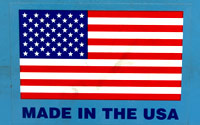Commentary
Why Brands Should Think 'Made In The U.S.A.' For Local Search Marketing
- by Laurie Sullivan , Staff Writer @lauriesullivan, March 29, 2013
 Remember the little "Made in the U.S.A." sticker or tag on products and clothing? It's back. It once stood for quality. It can again. Could it fit
into a company's local search strategy? In the past 9 months, the total number of visitors to search navigation sites conducted via mobile devices has jumped more than 25%, with nearly 86 million
people now seeking local business information on their mobile phones in the United States alone.
Remember the little "Made in the U.S.A." sticker or tag on products and clothing? It's back. It once stood for quality. It can again. Could it fit
into a company's local search strategy? In the past 9 months, the total number of visitors to search navigation sites conducted via mobile devices has jumped more than 25%, with nearly 86 million
people now seeking local business information on their mobile phones in the United States alone.
More than half of those who conduct local business searches said they use mobile phones, and 56% said they use the local business information sites weekly across all devices. Do a keyword search on the term "made in the U.S.A.," and google.com returns an entire section of American-made products on Overstock.com. Think of the brands Not Your Daughter's Jeans, Step2, and Levi's, which offer some products made in the U.S.A.
The tradeoffs for paying a little more for locally made goods could become the road to a better U.S. economy and growing advertising market. While General Electric said it will invest $1 billion through 2014 to revitalize its U.S. appliances business and create more than 1,500 U.S. jobs, reports CNBC, smaller companies like Los Angeles-based Chan Luu are also strategizing business models devoted to American-made products.
The Neustar Localeze and 15miles Sixth Annual comScore Local Search Usage Study, which analyzes a target sample of more than 3,000 users of local business Internet search, suggests that U.S. searchers on mobile phones grew last year -- from 90.1 million mobile phone visitors to search and navigation sites or apps in March 2012 to 113.1 million in December 2012. Searches on tablets grew 19% between April 2012 and December 2012.
Both mobile phone and tablet searchers find accuracy of information to be more important than depth of content. However, tablet searchers are placing more importance on depth of content over time, while mobile phone searchers are placing less importance on this measure. In addition, mobile searches are likely to cite maps, driving directions and distance as key information, while tablet searchers are more likely to find consumer reviews and online promotions most helpful.



